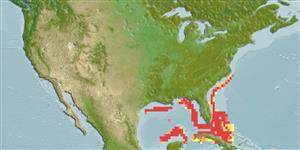Common names from other countries
>
Ophidiiformes (Cusk eels) >
Ophidiidae (Cusk-eels) > Ophidiinae
Etymology: Lepophidium: Latin, lepus, leporis = rabbit + Greek, ophis = serpent (Ref. 45335); crossotum: Name from Greek 'krossotos', meaning fringed, referring to the condition of the snout tip..
Environment: milieu / climate zone / depth range / distribution range
Οικολογία
Θαλασσινό(ά) βενθοπελαγικό; εύρος βάθους 91 - 384 m (Ref. 91765), usually 91 - 192 m (Ref. 91765). Tropical; 36°N - 21°N, 96°W - 75°W (Ref. 91765)
Western Atlantic: along the coast of the US from North Carolina (south of Cape Hatteras) to southern Florida and in the eastern Gulf of Mexico from western Florida to Yucatan.
Μέγεθος / Βάρος / Age
Maturity: Lm ? range ? - ? cm
Max length : 16.8 cm SL αρσενικό/απροσδιόριστο; (Ref. 91765)
Short description
Κλείδες προσδιορισμού | Μορφολογία | Μορφομετρία
Μαλακές ραχιαίες ακτίνες (συνολικά) : 117 - 125; Μαλακές εδρικές ακτίνες: 99 - 106; Σπόνδυλοι: 68 - 69. This species is characterized by the following: fringed snout; differs from L. kallion and L. wileyi by fewer total vertebrae (67-69 vs. 71-75 and 70-75, respectively) and lateral line length in SL (87.8% vs. 88.8% and 91.5%, respectively); differs from L. kallion in the number of dorsal rays (117-125 vs. 129-137) and anal rays (99-106 vs. 108-114), average post orbital length in HL (48.6% vs. 56%), average orbit diameter in HL (30.9% vs. 25.4%), average body depth at occiput in SL (10.7% vs. 13.3%), at origin of dorsal fin (11.5% vs. 14.5%), at origin of anal fin (10.1% vs. 11.9%), average predorsal distance in SL (22.1% vs. 23.9%), average preanal distance in SL (35.6% vs. 39.6%); head and body color is pale brown and without pattern (Ref. 91765).
Life cycle and mating behavior
Maturities | Αναπαραγωγή | Spawnings | Egg(s) | Fecundities | Προνύμφες
Robins, C.R., R.H. Robins and M.E. Brown, 2012. A revision of Lepophidium (Teleoastei, Ophidiidae), with descriptions of eight new species. Bulletin of the Florida Museum of Natural History 52(1):1-94. (Ref. 91765)
IUCN Red List Status (Ref. 130435)
CITES (Ref. 128078)
Not Evaluated
Threat to humans
Harmless
Human uses
Εργαλεία
Special reports
Download XML
Διαδικτυακές πηγές
Estimates based on models
Preferred temperature (Ref.
115969): 17.5 - 24.4, mean 21.7 (based on 37 cells).
Phylogenetic diversity index (Ref.
82804): PD
50 = 0.5000 [Uniqueness, from 0.5 = low to 2.0 = high].
Bayesian length-weight: a=0.00102 (0.00046 - 0.00225), b=3.06 (2.88 - 3.24), in cm Total Length, based on all LWR estimates for this body shape (Ref.
93245).
Τροφικό Επίπεδο (Ref.
69278): 3.5 ±0.7 se; based on size and trophs of closest relatives
Ελαστικότητα (Ref.
120179): Υψηλό, ελάχιστος χρόνος για διπλασιασμό πληθυσμού < 15 μήνες (Preliminary K or Fecundity.).
Fishing Vulnerability (Ref.
59153): Low vulnerability (11 of 100).
